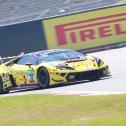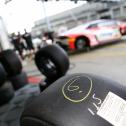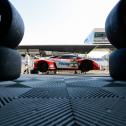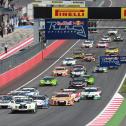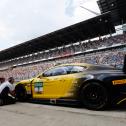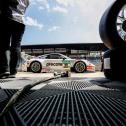Pressekontakt
ADAC e.V.
Oliver Runschke
Motorsport- und Klassik-Kommunikation
Tel.: +49 89 7676 6965
Mobil: +49 171 555 6236
E-Mail: oliver.runschke@adac.de
Kay-Oliver Langendorff
Leiter Partnerschaften, Kooperationen & Sponsoring
Leiter Kommunikation Motorsport & Klassik
Tel.: +49 (0)89-7676 6936
Mobil: +49 (0)171-555 5936
E-Mail: kay.langendorff@adac.de
05.09.2016 - ADAC GT Masters
The key to victory: tyre management in the ADAC GT Masters
- Practice provides an opportunity to simulate certain situations. New tyres indispensable in qualifying
- In the estimation of ADAC GT Masters exclusive tyre supplier Pirelli, tyre wear will be low in the season finale
Munich: Is the track fast or slow? Is the tarmac rough or smooth? Is the car at the front or back of the grid? There are many factors in the ADAC GT Masters that influence race tactics and tyre strategy along with it. Managing tyres properly can be one of the keys to success. We take a close look at the different options open to teams in the upcoming season finale at Hockenheim (30th September - 2nd October).
The slicks provided by exclusive tyre partner Pirelli in the ADAC GT Masters are what connect the 600-bhp supercars to the tarmac which varies in temperature, surface structure and grip from track to track. In the ADAC GT Masters, a maximum of three new sets of Pirelli tyres per vehicle are made available to teams at every meeting for the free practice sessions, qualifying and the races. Teams have a free choice of how they use them through the different sessions. A maximum of two sets of used tyres from a previous meeting can also be used in free practice. Teams need to think carefully before deciding which tyres to deploy in which session.
"Generally speaking, tyres play a greater role in free practice than you might imagine," said Bentley driver Christer Jöns (29, DEU, Bentley Team ABT). "They give you the chance to run through situations in crucial sessions like qualifying and the race. For example, do you do testing on a used set of tyres with a full tank to simulate a race or do you bolt on a new set of tyres to practise hot laps for qualifying."
The unanimous opinion among drivers is that there is no way around using two new sets of tyres in the two qualifying sessions, because, as Audi driver Markus Winkelhock (36, DEU, Phoenix Racing) said: "Lap times in the ADAC GT Masters are so close together, and a new tyre simply provides so much more grip over one or two laps that you would be at a massive disadvantage if you didn't use them and the others did. You could easily qualify 15 places further down the grid with the resulting seven or eight tenths of a second deficit."
You can still carve out a decisive advantage for yourself over the competition given the right tactics. Team Precote Herberth Motorsport, for example, pulled off a nice move in the first race of the Motorsport Festival Lausitzring. The Porsche team saved a set of new tyres for the first race and used them when starting in the race from pole position. Herberth driver Robert Renauer (31, DEU): "New tyres provide an enormous amount of grip over the first few kilometres. It makes sense to take advantage of fresh boots when you're on the front of the grid." Renauer himself proved it. On his way to winning the race, he pulled out a lead of more than four seconds over the first few laps after the start, nipping potential attacks by his competitors in the bud.
But what does the tyre manufacturer say? Why are new slicks faster than used ones? Michael Blaufuss, Head of Motorsport at Pirelli Germany: "Basically, you have to distinguish between slicks and standard tyres. A slick develops its performance over its lifetime. Sometimes they are faster and sometimes slower, and that depends on the combination of heat and pressure. Thus, grip levels increase until the tyre reaches its peak, and that's when it's at its best. After that, the level of performance remains stable, depending on what it's being used for, and then drops off again towards the end of its life. Ultimately, a used tyre that has already had several outings is no longer capable of attaining the same level of performance. Things are different with standard tyres. The extreme temperatures that are common in motor racing are not reached on the road where different performance parameters govern quality."
Pirelli Trackside Engineer Anna Playford tells us about the role tyres can be expected to play in the ADAC GT Masters season finale: "The Hockenheimring is a technically demanding circuit with a mix of fast and tight, twisting turns, fast straights and some hard braking points that put enormous stress on tyres. The tarmac is relatively smooth, and we're expecting mild weather and correspondingly low tyre wear."
Fans wishing to experience the ADAC GT Masters season finale at Hockenheim live at the track can obtain tickets in advance for just 20 euros (including paddock access) from www.adac.de/motorsport.
